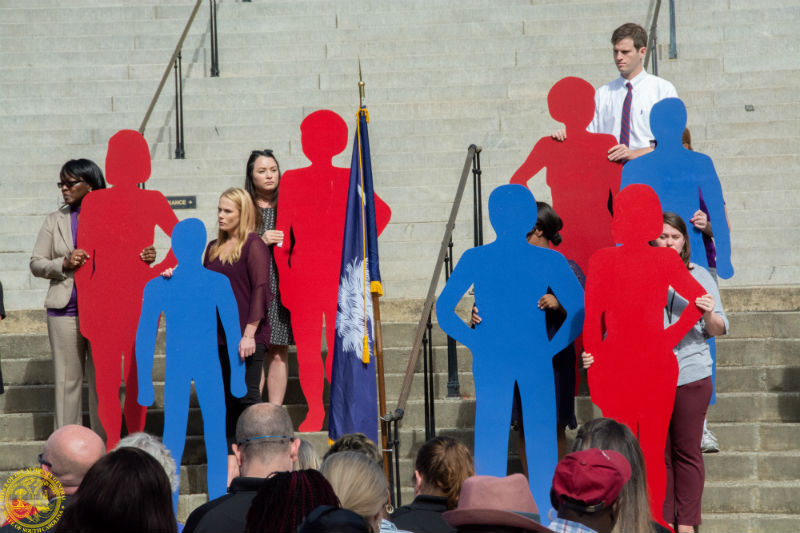
By Lindsay Street, Statehouse correspondent | The silhouettes representing 29 women slain by men stood silent on the Statehouse steps this week. For some public leaders and advocates, the women were emblematic of a deep cultural problem that can and should be further unraveled with the help of state policy.
In South Carolina, women face a higher rates of assault and sexual assault victimization than the rest of the nation. Lower-income women struggle with access to health care. Women fail to keep pace with their male peers in the workforce — whether its being paid less than a man for the same work or dropping out of the workforce entirely. And fewer women serve in public office and on boards that make decisions for other women.
- Read the latest report from the Violence Policy Center that lists South Carolina as the sixth most deadly state for women.
- See the 2015 report on the status of women in South Carolina.
“All of these things are intertwined with one another,” said Elizabeth Smith, chair of Furman University’s Department of Politics and International Affairs.

Many of the issues also stem from poverty or low wages in the state, she said. For example, a woman in an abusive relationship may be unable to leave without risking financial security or may be unable to afford housing on her own with her children. Another example: a young woman who is unable to obtain birth control may end up with an unintended pregnancy, impacting her education, her workforce opportunities and her potential wages.
Smith and others this week described to Statehouse Report how South Carolina continues to rank worse for women due to its culture.
“It has a long history of patriarchal traditions that have made it difficult for women,” Smith said. She said those traditions have been absorbed into the state’s institutions and laws. “We have not created by law or shown by law an interest in promoting equality.”
The following are four women — advocates and public officials — talked about what they see as issues for women in the Palmetto State and how they want to see them solved.
Sara Barber, Columbia
Executive director of S.C. Coalition Against Domestic Violence and Sexual Assault

Barber said South Carolina’s traditional roles for women combined with the state’s strong gun culture to make it particularly deadly for women.
“We have really weak gun laws in our state. Firearms are overwhelmingly the weapon of choice for men who choose to kill women,” she said.
Barber praised the state’s sexual assault laws, but she said consent and sexual assault needs to addressed as part of sex education in public school. South Carolina is among the majority of states that does not teach consent as part of its sex education curriculum. Consent means both partners agree to a sexual activity.
“We can’t approach talking about violence and sexual assault if we can’t talk about sex or sex only in terms of abstinence,” Barber said.
Barber also said she’d like to see better policy on rape kits to ensure evidence is tested and utilized; better protections for sexual assault victims when it comes to their voices in court; and better protections for victims when it comes to landlord-tenant issues.
She said the state needs to focus on better health care, affordable housing and better education to address many of the underlying issues facing women.
“We need a broader view if we want to change our state,” she said.
Margie Bright Matthews
State senator, D-Colleton

Bright Matthews is one of four women in the 46-member S.C. Senate. That means in a state made up of 51.5 percent women, the state Senate has fewer than 9 percent of senators who are women. The House isn’t much better. Of its 124 members, there are 23 women (18.5 percent). The national average for legislative bodies is 24.9 percent.
Bright Matthews said the lack of female representation is seen across the state in local governing bodies, boards and courtrooms. But even when outnumbered, women can still make a difference, she said.
Bright Matthew credited her fellow woman senators in stopping draconian abortion legislation from passing the legislative body last session.
“The women said, ‘No, we’re going to fight,’ and that’s what made the difference,” she said. Bright Matthews is one of two Democratic senators who are women.
Bright Matthews offered two examples where legislative representation by women is vital:
First, while the S.C. Public Employee Benefit Authority recently has added a woman to the board, Bright Matthews said that in the last cycle, there were no women on the board. As a result, she said, publicly-employed women no longer have their pap smears or mammograms covered.
“A lot of us did not realize this problem existed until some of us women in the Senate went to have our general health checked out,” Bright Matthews said.
However, the authority released this statement in response to Statehouse Report’s questions about its health care plan:
“The State Health Plan still covers routine mammograms and pap tests.”
Second, the Judicial Merit Selection Commission lacks a woman on the board. Bright Matthews said that is particularly worrisome since state circuit court decisions affect all South Carolinians. She also said an all-male board could be “insensitive to women’s rights and women working.”
“We still don’t have a female on that Judicial Selection Commission,” she said.
Lin Bennett
State representative, R-Charleston

Bennett also fingered culture as a culprit in violence against women, but said it was more of an underlying culture of violence that begins in elementary school.
“Culturally, violence seems to be a bigger thing. We have it in our schools and we can’t seem to get a hold of it. We obviously have it in our relationships and our politics,” Bennett said.
She said the problem has been worsened in recent years by a lack of family planning.
“We have so many children having children they wouldn’t know a parent if it slapped them in the face,” Bennett said.
Bennett said bullying legislation passed the House last session, but faltered in the Senate, adding it should be brought up again to help stop the cycle of violence.
“Everyone wants local control and I hate standardizing everything but this is something that we got to standardize because we have to know what’s going on, what kind of violence we keep dealing with, and then we need to help the children who are not just victims but the children who are doing it,” said Bennett, who was a co-sponsor of the bill. “I think we can correct a lot of this with a program that helps these children who will one day become adults.”
Bennett also bemoaned the lack of women in politics.
“We could use more women in politics. We think differently. We process differently. It doesn’t make us better or worse, but it certainly adds to the discussion,” she said. But, getting women interested seems to be an issue. Bennett said she tries to encourage others to run for off but is met with the response “Who wants that?” due to political “nastiness.”
Ann Warner
CEO of S.C. Women’s Rights and Empowerment Network, Columbia

Warner is pleased that South Carolina recently took a clear step forward in making workplaces better for women with the Pregnancy Accommodations Act, which requires employers to make reasonable accommodations, such as a offering a chair or water, for their pregnant employees. But she still feels like the state has a long way to go.
“The data are all pretty clear that South Carolina is not a great place for women,” Warner said. “(It’s) a pretty bleak picture on average of what the state of the state is regarding how we treat and respect women.”
Warner said it is going to take a cultural shift to help make it a better place.
“We need a movement for gender equality that includes women and men and that is diverse and includes all people from all corners of our state,” she said. “Having more equity and opportunity for women in our state is good for everybody. It’s good for their partners, their kids and their communities. We need more people to be vocal and active and speaking up for that.”
WREN, which formed last year, pushed for two pieces of legislation in last session, including the Pregnancy Accommodations Act. The other piece allowed women to obtain prescriptions for 12-month of contraception. That bill stalled in the Senate.
Warner said her organization will push for the contraceptive bill to be reconsidered.
“We see it as a practical way to break down some of the barriers that women have to being able to access reliable and consistent forms of contraception,” Warner said. “Being able to have control over if when and how you start a family is so fundamental to your life journey … Being able to have access to contraception puts that power in a woman’s hand so she can make those critical life choices that determine so much for her and for her family.”
Warner said an equal-pay statute would go a long way toward ushering in more equality in the state, as would educating women for non-traditional careers and urging employers to find ways to be more woman-friendly
- Have a comment? Send to: feedback@statehousereport.com



Great article.
Sound very good to me. I want this too.
Excellent article and for highlighting the great work done by WREN, thank you.